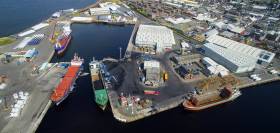Displaying items by tag: Port of Ayr
Scottish South-West Port of Ayr Invests £2.2m In New Agri-Bulk Terminal
#ports - The Scottish south-west Port of Ayr, operated by Associated British Ports (ABP) has announced a £2.2m investment in a new state-of-the-art warehouse which will improve its customer offering.
Work on the new 4,000 sqm agribulk terminal according to ABP began in 2018 to support the region's growing agricultural sector. The new facility will be located on the west side of Griffin Dock at the port.
Commenting on the latest investment news, Andrew Harston, ABP Short Sea Ports Director, said: “We are proud to announce another major investment in our Scottish ports to ensure that we can continue to offer our customers the best infrastructure available to help their businesses grow.
“As the UK's leading company in our sector, we are committed to an extensive investment plan focusing on the Ports of Ayr and Troon and we would actively encourage Scottish businesses in need of first class port facilities in the West of Scotland to come and talk to us.”
The contract for building the warehouse has been awarded to a Scottish family-owned company, 3b construction, in line with ABP’s “buy local” strategy, which aims to support local businesses.
Stuart Cresswell, ABP’s Port Manager at Ayr and Troon, said: “Following other recent investments in warehousing, cranes and a new pilot boat, the development of another major agribulk terminal in Ayr is a huge vote of confidence in both our Scottish Ports and our local workforce.
“I strongly believe that the facilities we are developing at Ayr and Troon offer a beacon of hope for the many Scottish voices calling for a renaissance of maritime-related industry and shipping on the Clyde.”





























































